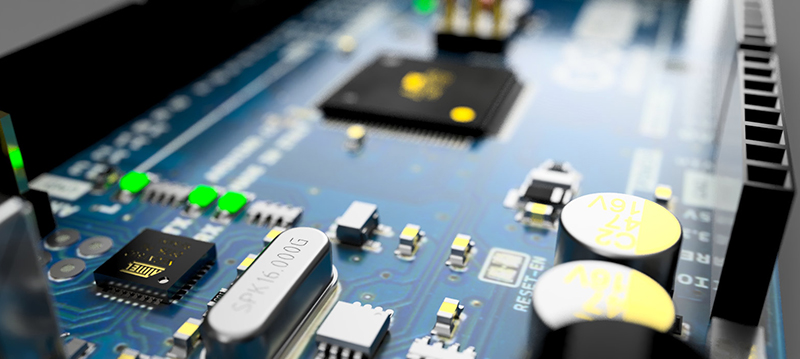Making the jump from being a traditional employee to being a freelancer is something that many professionals consider at some point or another, regardless of the field. Before committing to such a decision, there are plenty of factors to consider.
Even then, deciding to work as a freelancer comes with more risk than a traditional job, but also far greater rewards. However, is this just an A or B scenario? Is there another way to go about things? Let’s cover the basics first.
What is Freelancing and How Does It Work?

The idea of being an electronics engineering freelancer is something that holds plenty of appeal to many professionals. People tend to picture a daily life that includes working at home in your pajamas or perhaps leisurely getting dressed to work from a table at the nearest Starbucks instead. Sometimes things work out this way.
The full story, however, is that freelancing comes with an array of challenges that would not be encountered if one is traditionally employed. That being said, there are professionals all around the world that wake up each morning and overcome the unique challenges of freelancing to have successful and satisfying careers that they control.
Freelancers can choose how many clients they have, how much work they do, and how much they charge. In addition to these factors, it’s the sheer freedom of freelancing that draws people in.
Where Does the Work Come From?
So, since freelance engineers aren’t traditionally employed, where does the work come from? This may surprise you, but it can come from the very same companies that have traditional employees. It’s not uncommon for small, medium, and even large companies to hire freelancers to work alongside their employees.
Sometimes a specific skill is lacking in their team. At other times, it may just be a matter of work volume. The company may need an extra hand or two to keep up during an especially busy time. In situations like this, the relationship can begin as a short-term agreement and become something that lasts for years.
In addition to businesses that already have full-time employees, many freelancers work with entrepreneurs and startups. Solo entrepreneurs and new startups sometimes lack funding, but most of the time, they’re quite happy to have your help as well as any professional input you may have to offer. They also tend to be easy to work with, so long as you don’t find yourself under the thumb of an extreme perfectionist.
Other than various businesses, solo entrepreneurs, and startups, freelancers sometimes work for each other. This type of scenario can happen in virtually any field. For example, if you’re new to freelancing, you could work as a sub-contractor taking excess work from an established freelancer who provides the same services.
Alternatively, you could work on a project being completed by a different type of freelancer. If you’re an electronics engineer, you could potentially work as a contractor for a freelance computer engineer. Let’s say they specialize in software and need a bit of help with hardware design. It could result in a new project or even an ongoing business relationship.
Benefits of Working as a Freelance Electronics Engineer

When it comes to benefits, the benefits that are enjoyed by freelance electronics engineers are generally the same as the benefits that draw professionals from all fields to freelancing. Let’s list a few of the most notable benefits one by one.
1. Scheduling Freedom
In many situations, you have plenty of ways to plan out your schedule. Freelancers decide on their availability after all. Flexibility is an excellent quality to bring to the table. Clients appreciate it when that flexibility benefits them, and you get to enjoy that flexibility in any way you choose the rest of the time.
Many professionals begin freelancing primarily for the scheduling freedom. As a salaried employee, income is consistent. If you feel like earning more as a freelancer or taking a vacation, schedule appropriately.
That being said, professional courtesy applies here. If you have ongoing projects and you plan on taking a vacation, you should notify your clients ahead of time and accommodate as necessary. There are few things that irritate clients more than freelance professionals who disappear and pop back in without any prior notice.
The scheduling freedom that this type of work allows can also be a massive benefit for anyone with a family. Let’s say you need to step out of the office for a couple of hours to take your child to their doctor’s appointment. As a freelancer, it’s easy to walk away and return to work later in the day. As an employee, you may find yourself in a conflict with your supervisor due to short notice or other factors that may be beyond your control.
2. Setting Your Own Rates

As long as you’re bringing an appropriate level of skill and value to the table, you’re free to charge what you please when working as a freelance electronics engineer. Rates have to be within reason, but what that amounts to in dollars and cents goes back to your skill and value. Are you dependable? This is one quality that clients love because it brings them peace of mind.
Experience is another factor with rates. Typically, the skill level is more important, as long as reliability isn’t an issue. Have you ever felt like you would pay anything to finally have a solution to a problem you’re facing?
Maybe your car needed a repair that could only be completed at a particular garage, but they were too busy to take care of it immediately. Many clients find themselves in a similar position. This is what the right freelance engineers offer to clients.
3. Choose Projects that Interest You
It’s not good practice to shrug off potential projects, especially if you have specifically been asked to bid on them. Overall, freelancers do have a lot of control over the projects that they are involved with. It’s undoubtedly far more control than a full-time employee has.
When you get to choose which projects you work on, work becomes more enjoyable. A lot of satisfaction in freelance work comes from this freedom of choice. Everyone has been involved with projects that they didn’t like for one reason or another, but freelancers have more flexibility there.
Freelancing as an Electronics Engineer
Working as a freelance electronics engineer is somewhat similar to working as a freelancer in any other field. If you work remotely as many do, you may never see your clients face-to-face. This usually isn’t an issue, but some come to miss this aspect of business relationships and adjust by making it a point to meet clients in person.
As a freelance electronics engineer, it’s easiest to begin by joining appropriate online platforms. Online platforms for freelancers have projects listed, and any interested freelancer can usually bid on them. The biggest downside of general freelancing platforms is that rates often skew low due to a vast pool of professionals working from various locations around the world.
Tips for Working as a Freelance Electrical Engineer and Finding Projects

There are so many ways to get work as a freelancer that merely deciding on which way to go can be overwhelming. Let’s start with the basics that everyone should be doing.
Direct Marketing
Direct marketing has many forms. It could be a letter, a postcard, or even an email. This type of marketing is used to target prospects that fit the profile of your ideal client.
In the case of a direct mail piece like a letter, it’s a simple process. Once a company has been chosen, write a letter to the appropriate contact there. The letter should include things like your qualifications, skills, and background. The most important thing to add is a description of how your services can benefit them. In other words, sell yourself. Once you’ve sent the letter, be sure to follow up.
Internet Presence
Websites are an excellent tool for independent professionals. They’re very affordable if you build it yourself, they give you fantastic visibility, and they’re always just waiting to be found. If you put together a website, you can enhance its visibility further with things like search engine optimization, social media profiles, and blog posts.
Specialized Platforms
What general freelancing platforms lack in benefits, specialized freelancing platforms offer in spades. One of the most significant differences is in the attitude of the clients that offer projects there. On general platforms, price is often the deciding factor over all else.
Specialized platforms like Cad Crowd draw clients with a different mindset. They tend to prioritize quality work and smooth transactions. Since they are looking for expects and need quality, they’re ready to pay appropriate rates for it. The difference between general and specialized freelancing platforms really can be night and day.
Q&A

1. What qualifications are necessary to work as a freelancer?
This varies by field. In theory, technically anyone can offer their own professional services. It’s best to have at least the minimum standard qualifications that are specific to your field. It’s even better to have advanced qualifications if possible.
That being said, some clients are more concerned about the skill and attitude of any freelancer that they are considering. The impression you make on a potential client is critical; it may even be more important than your qualifications at times.
2. How much do freelancers make?
This also varies by field. Freelancers have far more control over compensation than traditional employees. Charging by the project, by the hour, and even royalty arrangements are possible.
Some freelancers make less than their traditionally employed counterparts. This is often only due to personal choices. Other freelancers make more than comparable employees, potentially several times more when advanced strategies are used.
3. Since freelancing comes with its own challenges, is it worth it?
This is an individual matter. People who prioritize personal and professional freedom and enjoy making major decisions on their own often answer with a resounding yes. If security, daily consistency, and company benefits are high priorities, then freelancing would likely be a better fit as an additional income stream.
4. Is it possible to work as a freelancer while keeping a traditional job?
It is possible to continue working as an employee while also working as a freelancer. In this scenario, one income stream must have a higher priority than the other.
Working as a freelancer and an employee is typically limited by time and schedule. If a freelancer is employed for the same skills that they offer on a freelance basis, they may jeopardize their employment by doing so concurrently.
5. Should I have my own tools?
Yes, you should own or have access to any tools, software, or equipment that may be necessary for the services you offer. This is important whether working from your own location or working onsite with a client.
Definitions

- Freelancer – A professional who is working but is not traditionally employed. Freelancers may be considered self-employed. In many instances freelancers are working as a type of contractor or even a sub-contractor. Some freelancers have many clients while others have very few or only one.
- Client – In the case of a freelancer, clients come in many forms. A client can be a business, an individual, or an organization. Regardless of who a client is specifically, a client is someone that hires a freelancer for their services.
- Prospect – Prospecting is the process of finding new clients. A prospect is a potential client.
- NDA – Non-disclosure agreement
- Contract – A legal agreement that may be used between a freelance professional and a client. Basic contracts simply state things like the price or rate along with the work that is to be completed.
- Platform – A place or website where freelance professionals and those seeking freelancers go to find each other. Typically these platforms allow freelancers to browse available projects while clients have the option to browse available freelancers.
Rates
For freelance electronics engineers based in the United States, hourly rates vary widely. Keep in mind that these rates are typically set by the engineers themselves, but negotiation can also be a factor when working as a freelancer.
As for freelance electronics engineer hourly rates, there are some very low numbers to start with, but they are a minority. Some are willing to work for $20 an hour or even a little less.
However, many are in the $35 to $45 per hour range. These rates are more in line with what electronics engineers are paid as employees but still a little low. Above this, some are charging $60 to $100 per hour or more.
These rates are much more common on specialized platforms. As far as a cap or limit, there isn’t one. It’s all about your skills and your ability to find suitable clients. Some freelance electronics engineers earn far more than any of their traditionally employed peers.
It’s important to remember that hourly rates are just one way of charging clients. As they build experience, many professionals move to per-project rates. Per-project rates vary widely as well, but highly experienced freelancers often make an even higher rate by pricing services this way.
Research Advice

There are plenty of experienced freelancers in various fields that have found success and moved on to teaching others. Whether those lessons come in the form of blog posts, books, videos, or classes, the information is available.
When possible, it’s best to learn from a source that is familiar with your field. The process of working as a freelancer is generally the same, but some fields do have their own quirks. When there are specific differences that apply to your field it’s much better to be aware of them. This way you can be prepared, instead of being caught off guard and potentially causing a new client to doubt you.
Books on the subject of working as a freelancer tend to be more comprehensive as far as the lessons inside. Other types of resources can be quite valuable as well, sometimes those who have already walked the path just want to give back and leave some real gold nuggets of wisdom. There’s plenty to learn, so if you’re new or considering freelancing then research as much as possible.
Experienced and Ready to Start?
If you’re an experienced electronics engineer with an impressive portfolio and you want to make the jump to working as a freelancer, there are several ways to go about it. If you also have a proven track record, are ready to demonstrate your skills, and maintain a professional attitude, then you may be Cad Crowd material.
Large and small businesses alike turn to Cad Crowd when they need freelance electronics engineering services. For designers, we take the hassle out of finding new projects and hourly work. We’re constantly connecting companies with the right professional for the project. If you have what it takes, you can get started by creating a designer account today.
Cad Crowd’s pool of professionals can also provide you with extra help when you face tight deadlines, are overwhelmed with projects, need to take some time off, or if a project requires skills that may not be your strong side, such as photorealistic 3D rendering services.
If you’d like to find out how you can do it, take a look at how it works.
